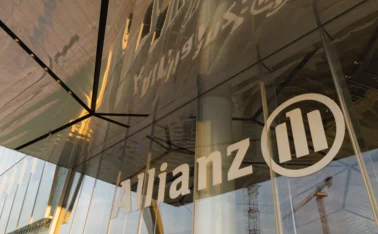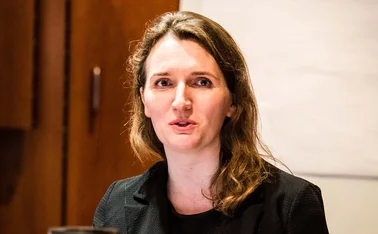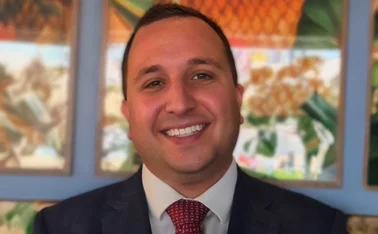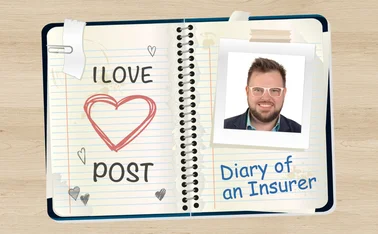
Women entrepreneurs: Insurance start-ups

Five female insurance entrepreneurs give Jonathan Swift the lowdown on the start-up sector
Have you seen an increase in start-ups and what is behind it?
Sam White, CEO and founder Pukka Insure: I have seen a lot of start-ups in the managing general agent space.
Penny Searles, CEO and founder, Smart Driver Club: That is because people have come out of brokers and looked to launch MGAs because they want more control than simply broking products. But the growth area is innovation. So all of us here are doing something different that gives us a unique selling point. Whether it is the claims management with Sam’s MGA, my telematics and distribution play, or for the others the digital future.
There is no room for a standard MGA or broker now, they would fail miserably. The investment is following those that have the energy and are doing something different.
Phoebe Hugh, CEO and co-founder, Brolly: There are so many technological advancements at the moment and every industry is seeing huge change, but in that respect insurance has lagged behind. You have the incumbents and the start-ups and the incumbents are not moving quickly enough, so the start-ups have a great window to do something different. We just have to seize it because we are sitting on tons of data representing an amazing opportunity.
Gabrielle Hase, CEO and founder, Cat Dog Fish: It feels like there are more start-ups now than there have ever been. Like anything, it builds momentum and once some investors smell blood in the water, the others come circling.
The challenger banks have been getting a lot of press, which has brought people into the wider fintech space – and insurtech as a subset of that is starting to get attention. Finally, the closer everyone from the outside look, the more they realise what the people on the inside have known for years: there are tons of inefficiencies in the system and that is what start-ups are looking to address.
Annabel Mekelenkamp, chief operating officer, Digital Risks: There has been so little disruption and change to the core product, systems and indeed everything to do with insurance, so there is lots of room for improvement. Business insurance – our speciality – is even more outdated than other lines. I was really surprised that you could not tick boxes – like you do when you book a flight to get travel insurance – to buy business insurance. It is far from impossible. These things have existed in personal lines for many years, but don’t exist in business insurance.
PS: If you think about it logically, insurance is going to be risk averse. From the people who work in it to the policies it sells. As a start-up, I could not believe how antiquated business insurance was in that I had to sit in a smoke-filled room with a broker and spend hours filling in paperwork to get the different covers I needed.
There was no online capability. Even those that said they had it didn’t, and as an industry the carriers have kept control of that. So the only real innovation we have seen in the last 15 years has been the advent of price comparison sites, and that was fantastic for the consumer, and at first the carriers and brokers loved it, until they realised they had lost control of distribution. They don’t like change.
SW: And it is a complicated process to get started, so sourcing capacity is not straightforward. You cannot just rock up at an insurer and do a deal. Throw in the regulation, and everything is designed to slow you down. And entrepreneurial businesses don’t want to be slowed down, they want to start experimenting and change as they go along.
PS: That is the thing with insurance: you have to do a full launch. You cannot talk to a carrier until you are regulated, unless you have a good reputation. Then you need an investor with deep pockets behind you because you could be looking at a 24-month period to get to market.
SW: We started everything at the same time so if we hit a brick wall, we could move on to something else. I have aged years through the process but if we had waited for each part to be completed before moving onto the next one, I dread to think how long it would have taken.
PS: I am lucky because I have been in the industry for a while, so we were able to have tentative conversations about getting capacity. And to be fair, the carriers are being beaten up at every turn too. Appointed representatives were an easy way for businesses to start up and to grow into their own space, but all of a sudden the regulator does not like them. They tend to have more discipline than others, it is just that the regulator seems to be treating them all as if they are all selling extended warranties. It is ridiculous.
PH: I have not found regulation too challenging but we have gone down the AR route as a means to get to market. The Financial Conduct Authority has launched its innovation hub and we are part of that because it makes it easier to pick up the phone and speak to someone. But if you are going down the carrier route, that takes up so much time and energy – and time is really crucial when you are running out of money.
You also have to be smart about your resources. So we have started as an AR and are seeking full authorisation as well, but we have been able to ship a product, so we can start learning from our customers before we move to our own regulated activities. But even being an AR, our principal broker has to make sure we have controls and processes in place; that our compliance is up to speed and we are using that experience to get fully authorised.
AM: We wanted a lot of things from our underwriters such as a monthly subscription model. It is understandable that things that challenge the norm take a long time but it is something we underestimated. So that delays you, which is not ideal if you are on a tight timescale with limited money. It has been difficult judging how long things are going to take.
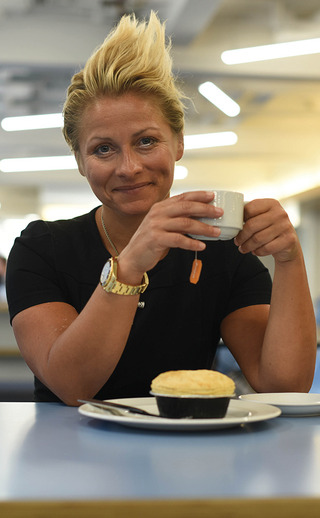 Sam White, CEO and founder Pukka Insure
Sam White, CEO and founder Pukka Insure
Can you describe the Eureka moment from which your start-up was born?
Since I started my claims business back in 1999, it had been on my mind that I wanted to set up an insurer but it seemed very complex and I was very focused on establishing my original business. Then last spring I was sitting in the garden talking with friends and they asked me why I hadn’t followed my dream and for the first time it seemed completely achievable. The timing was right, things with Action 365 were going from strength to strength. So then it occurred to me that the real question wasn’t why I shouldn’t do it but why not.
Describe what makes your business stand out in the form of a tweet
Highly innovative, constantly evolving, family-run business. Pursing excellence, putting the client as the very centre of our focus.
Which entrepreneur – insurance or otherwise – do you most look up to?
I have always admired Richard Branson, the Virgin founder. He’s a true maverick. He gets that being effective in business doesn’t mean that you have to sacrifice your morals and lose your soul. He has incredible ideas, he’s fearless and he surrounds himself by incredibly talented people. He’s open-minded, intuitive, adventurous, he follows his gut instincts and, most importantly of all, he’s not afraid of failure.
Where do you think your business will be in five years?
Hopefully continuing to grow, it has exceeded all of our expectations so far and it’s in the top 10 specialist insurers in the UK. I want to continue to grow the team and create an unrivalled, passionate, dedicated workforce offering up an intuitive insurance solution that puts the customer front and centre in everything we do. I also want to continue our philanthropic endeavours, that’s extremely important to me. The more successful we are, the more we can give back.
If you could go back in time and lay claim to one invention, what would it be and why?
It would definitely have to be the iPhone: it was such an iconic game changer. I love the concept of smartphones in general and staying connected. What makes the iPhone different, and this applies to Apple in general, is the technology, I love that it’s so intuitive, I love the aesthetics and I really admire how Steve Jobs wasn’t averse to taking risks. He was such an inspiration to me.
If your business was a fictional character, who would it be and why?
Batman – a true force for good, determined to do things differently and use his resources to make a change. He’s not naive, he’s been around the block a little and people feel safer knowing he’s around. He has integrity and he’s an awesome problem solver. And, let’s face it, he has a cool outfit and even cooler toys.
Do traditional insurers have a role to play in encouraging start-ups?
SW: They have the money, the knowledge and everything going for them, so it would criminal if they didn’t. Whether there is enough of that happening is down to the cultural problems within larger insurers. They might want to be innovative and entrepreneurial but that does not sit comfortably with large corporates because they have so much money to lose and they tend to be risk averse. I have seen some interesting stuff from insurers where they have siloed out funds and allowed people to do their own thing rather than control it from within their existing infrastructure, which is where this stuff tends to get killed.
PS: Aviva did that with Quote Me Happy and demonstrated it can be done.
AM: Our underwriters Aviva and Tokio Marine have been really supportive of Digital Risks, but they all have departments that have an opinion about what you want to do, like a monthly subscription, and it affects that relationship.
PS: People change – you might be dealing with someone and they move on and you have to start all over again with a different project team. It is very frustrating, which is why from an investment point of view, we looked elsewhere [outside insurance]. We might look to work in partnership with them, but you need consistency.
SW: It should not be like that because if [insurers] invested in some of these [start-up] endeavours, it would massively improve their business. But to have any chance of succeeding, it has to be taken out of the corporate infrastructure. They have to let go of control and take a leap of faith in a group of individuals who they think are doing something special. To provide the funding but stand back.
PS: If you look at Aviva, it was mocked for spending a fortune on Pay As You Drive, but if it was not for that, I would not have started Wunelli. We watched what it did and yes, it did spend a lot, but it was first in and if it had stuck with it, it would have been leaps and bounds above everyone else, but it stopped for five years and did not pursue it.
GH: I was talking to a big institutional investor and they told me they did not think it is possible for these venture capital arms of the large insurers to really do what they want to do. They thought having a gem of an idea and then taking it from zero to launch, that has to be done outside the system.
But insurers could have a role in giving start-ups that next level of funding and infrastructure where the firms have more say and control. The challenge is that you have these businesses incubated in these insurers and they don’t have a fighting chance because it is in the self-interest of the insurer – not because they are evil people – to protect the status quo.
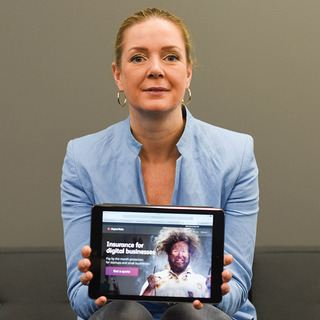 Annabel Mekelenkamp, chief operating officer, Digital Risks
Annabel Mekelenkamp, chief operating officer, Digital Risks
Describe what makes your business stand out in the form of a tweet
.@digitalrisks is the first insurance provider to focus 100% on the needs of digital businesses!
What makes insurance an attractive sector in which to launch a start-up?
The insurance industry has been slow to respond to changes in the business and risk landscape, as well as how customers want to interact with brands. The start-ups of today are digital-native Millennials who expect a seamless online experience, flexibility, transparent communications and pricing, plus ongoing engagement. The traditional broker model hasn’t delivered and we’re now seeing a revolution led by digital innovators. It’s a huge market and there are so many opportunities to do things better.
Which entrepreneur – insurance or otherwise – do you most look up to?
Our CEO Cam Shearer. He’s always thinking long term, but also gets so much done in the day-to-day. He’s a natural leader and somehow always has energy and attention for the people around him, as well as consistently challenging the status quo.
Where do you think your business will be in five years?
In the next five years, we will have expanded the business internationally and be established as a serious player in the insurance market. As innovation is key for us, our products and service will play a big part in the insurance revolution.
If you could go back in time and lay claim to one invention, what would it be and why?
That would have to be cheese, for obvious reasons.
If your business was a fictional character who would it be and why?
Q from the James Bond films. Because we are constantly inventing and innovating, always one step ahead, and giving our clients the protection they need – whatever tricky situation they find themselves in.
Could the latest insurer interest in start-ups be a short-lived fad?
AM: You only have to look at how fintech has been adopted elsewhere to know that [insurtech] is coming. There was some reluctance in fintech 10 years ago but now claims people and underwriters can see it as a reality.
PS: Insure The Box was sold a year ago and if [a retail insurer] had put its money where its mouth is when [founder] Mike Brockman was looking for investment, it would have made a lot of money. Now someone has come along and bought that innovation, but it wasn’t an insurer, it was a car manufacturer, or its insurance arm. Toyota’s Aioi Nissay Dowa bought ITB when it should have been one of our insurers. It was shocking it did not go to a UK insurer.
Where is the most fertile ground for start-up investment?
SW: We went with our own bank because I had an existing business. But we also got some money from the funding arm of the local council that was looking to create jobs in the area, so it was outside the insurance industry. If we’d tried to do a deal with a capacity provider, it would have caused us quite a lot of problems in the early years.
AM: We did a small angel round in March and found that there was a lot of interest including venture capital firms, incubators and accelerators. But we felt we were educating them on insurance and they weren’t ready to invest yet. So at the end of the process, we got the money from ‘angels’ and most of them were from the insurance industry and understood why what we are doing is so innovative. We found that people outside the industry were not comfortable investing in it yet.
GH: If you have a technology platform that ultimately is sector agnostic, that is really appealing and it will always get the money. But if you are doing what we are doing, which is around the affinity market and people who love their animals, that is only going to attract an investor who understands the pain of being a pet owner. An angel investor that has other interests but realises what we are doing adds value.
PH: There is a lot of VC money going into insurance around the world, but whether they are going to invest in early stage companies is less clear. There is certainly some serious funding in Series A and Series B [capital financing].
As someone building a company, you need to think what you want from an investor. So if you are looking to an institution or corporate, you need to ask what that investor will actually mean for you. Are they going to help you on the insurance side? Give you operational advice? It is about making sure you have the right partner. So if you are launching a B2C product, is it more relevant to have someone who has worked with a consumer brand?
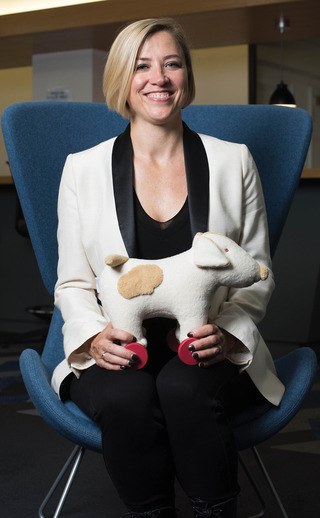 Gabrielle Hase, CEO and founder, Cat Dog Fish
Gabrielle Hase, CEO and founder, Cat Dog Fish
Can you describe the Eureka moment from which your start-up was born?
There wasn’t one – just a growing level of frustration that there is a lot of information about pet healthcare and where insurance fits into that but that it isn’t easy to understand and interesting to interact with. It comes from being a pet owner and not being happy with the haphazard way of trying to understand how to best care for my pets.
Describe what makes your business stand out in the form of a tweet
.@CatDogFish is the new breed of premier pet healthcare portal created by pet owners for pet owners, video-based and vet approved.
Which entrepreneur – insurance or otherwise – do you most look up to?
My father. He migrated from Eastern Europe to the US when he was 16 and couldn’t speak English, and has since built a very successful network of advertising agencies with nothing more than his sheer tenacity and drive.
Where do you think your business will be in five years?
It will be the most trusted name in pet health and wellbeing. The products and services it offers will evolve over time and will be driven by what the modern pet owner needs, but the fundamental value proposition will stay the same: a whole generation of pet owners who enjoy a very strong bond with their healthy pets.
If you go could back in time and lay claim to one invention, what would it be and why?
The telephone. It’s the basis of modern communication and anything that gives us the ability to talk to each other is a good thing, and it all goes back to the basic invention of the phone.
If your business was a fictional character, who would it be and why?
Klaus, the fish from American Dad. All he wants to do is help people from his fishbowl (he’s a psychiatrist trapped in a fish’s body). He’s cheeky, funny, and desperately devoted to his higher calling.
So are most people interested in insurance because they have heard about the disruptive possibilities, rather than actually understanding it?
PS: For some, it is a tick-box exercise in that they have been asked to look at insurance or fintech start-ups, and they can go back [to their employer] and say they are doing it. But are they serious?
AM: Insurers are quite conservative, so if you look at people in the hedge fund world or big banks, they are more likely to be angel investors than really successful people in the insurance industry; their personalities are different.
GH: The first rule of angel investing is that you have to be prepared to lose your money. That is the nature of seed investing and it takes a certain type of person to be OK with that – and insurance might not breed a lot of those people. It is not a bad thing, but a function of the industry.
SW: With insurance you are always looking backwards. We got approached by a couple of potential investors and they wanted to verify what we were doing by going to the usual consultancy suspects. But the problem is we are doing something completely different to what others have done before. So they could not verify it, and if they can’t understand it, then they are not going to buy into it and that is a problem.
PS: I did not even bother in the UK. I went to California and met a company that, if my model works, could replicate it in the US. I did not want to go anywhere near VCs. And I did not want to do [funding] rounds because every time you do one, you get distracted from your business for six months and end up with another person or company to whom you have to justify what you are doing.
Californian investors are also much better at trying things. They have seen what little bits of money can deliver and understand that disruption in any industry tends to at some point deliver value. You can be too soon or too late, but if you are at the right time, you can make a lot of money.
In the UK, we are educated to go through rounds of funding and seeds and to look for angels. And in my first business, I had a great angel in Sandy Dunn [co-founder of BDML], but you don’t get many of them and they have limited amounts of funding, so you are stuck a little bit.
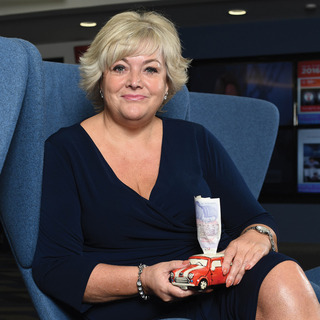 Penny Searles, CEO and founder, Smart Driver Club
Penny Searles, CEO and founder, Smart Driver Club
Can you describe the Eureka moment from which your start-up was born?
Having worked with telematics insurance for several years, I became increasingly frustrated that the add-on benefits, all the services that telematics connectivity gives consumers, were being ignored. I was buying a car and taking out AA roadside assistance and thought: ‘Wouldn’t it be great if there was a driving club you could join that gave you all the benefits, including cheaper insurance, if you were a good driver?’
Describe what makes your business stand out in the form of a tweet
We are unique, no other driving club membership offering in the UK provides our range of services, making cars talk for a monthly fee. We are with you all the way...
Which entrepreneur – insurance or otherwise – do you most look up to?
Arlene Dickinson from Venture Communications, a Canadian company. Very creative and strategic, a challenging combination. She married at 19, had four children and carried on working so her husband could get a university degree. He got the degree, a good job when she was 31. He divorced her and got full custody of the children as the judge said she didn’t earn enough to look after them. Lesser people would have given up, but she was determined to succeed and she did. Now one of Canada’s most successful businesswomen.
Where do you think your business will be in five years?
I’m hoping we will have one of the largest driving clubs in Europe and that 30% of those members choose to have club motor insurance.
If you could go back in time and lay claim to one invention what would it be and why?
Satellite technology. It changed the world.
If your business was a fictional character, who would it be and why?
Mickey Mouse – fun, loved by everyone, important, influential and iconic... And no one would have believed he would still be around.
How does London rank as an innovation hub and magnet for start-ups?
AM: I did not particularly come to London for a start-up, but there is a lot of energy going on here, and we are based in Shoreditch and there is a really nice buzz, but your run rate is so much shorter because it is so expensive.
SW: We do have one of the most competitive markets in the world. It is survival of the fittest and that breeds creation of new ideas, because you have to innovate or die. If you are looking for the best people to manage your business, there is no question London is a great spot because many gravitate to the place they perceive as the best and live there. That does not mean that innovative good businesses cannot be found elsewhere.
AM: We chose London to not only be close to our underwriters but our clients too, which include start-ups. To be close to that community and ask them what they need in terms of insurance.
PH: I am from London and worked in the London insurance market, so it was natural to end up here as it has a big tech scene, which is what I left my corporate job at Aviva to join. Now there are plenty of incubators and accelerators around the UK but the one I joined – Entrepreneur First – was in London.
PS: But if you look at other people who have set up successful start-ups, they have done it regionally. So Hayley Parsons left Confused [in South Wales] and set up Go Compare locally and the Igo4 team came out of BGL and stayed in Peterborough.
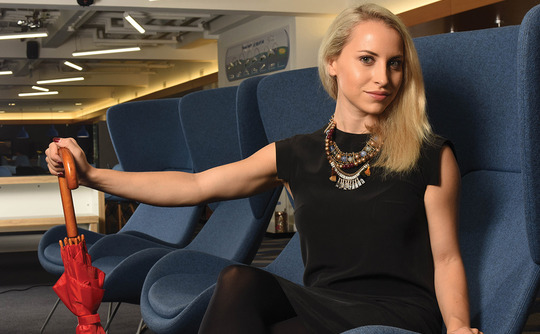
Phoebe Hugh, CEO and co-founder, Brolly
Can you describe the Eureka moment from which your start-up was born?
The real Eureka moment was a culmination of many non-Eureka moments. Whenever I told someone that I worked in insurance, they would usually sigh, before listing all of the problems and bad experiences they’d had with either their personal or business insurance. It became strikingly obvious that there was an opportunity to create a trusted consumer brand that would automate and personalise everything that is so manual and opaque for customers today. It was from this realisation that Brolly was born.
Describe what makes your business stand out in the form of a tweet
Brolly is the UK’s first artificially intelligent personal insurance app – built for the smartphone generation.
Which entrepreneur – insurance or otherwise – do you most look up to?
Alice Bentinck, the co-founder of Entrepreneur First, Europe’s leading pre-seed investment programme and the programme that Brolly has just graduated from. Not only did Alice inspire me to quit my job in insurance to start Brolly, but what she has achieved in building Entrepreneur First is just incredible.
Where do you think your business will be in five years?
Brolly will be the de facto insurance ecosystem where people have all of their insurance needs managed within a single policy that truly reflects their holistic risk.
If you go back in time and lay claim to one invention what would it be and why?
The musical instrument – for what is life without beautiful music?
If your business was a fictional character, who would it be and why?
Mary Poppins. Our artificial intelligence is akin to her magical abilities... and we greatly admire her chosen method of transportation.
Will there ever be a UK equivalent of the US start-up poster children such as Oscar or Lemonade?
PS: I don’t think we will ever have a poster child like them because we don’t like people being successful. In the US they will applaud and throw money at them while in this country we are very cynical. As soon as anyone gets there, we try and knock them down.
AM: The Dutch are similar to the British people. We don’t have a US mentality where you go for big and bigger. From a business perspective, we wonder if it is good to have millions thrown at you because they will expect a certain return on investment.
SW: And maybe you don’t try as hard [if you get that much investment early]? You look at the successful businesses like Admiral and Sabre, they started very small and built up.
GH: It will take longer, but in the US you have a shed load of money, the stakes are higher, the need is much greater as it is a very big place and the valuations are very high right now. So that environment means the US will have more of those stories.
In the UK and Europe, if you look at any VC, they are much more conservative across the board. But because London is the birthplace of insurance, it will get its act together. And if you look at people like [Bought By Many’s] Steven Mendel, he is from insurance and taking no prisoners and I have a lot of time for that. It will take longer but we will have stories out of London that are the equivalents [of Oscar and Lemonade].
Finally, does being a woman have any bearing on your success with a start-up or otherwise?
SW: In a competitive market, anything unusual gives you an advantage because people will pay attention.
GH: Women in fintech is novel. Compared to other sectors I have worked in, I am often very surprised that I am one of the only women in the room.
PH: I agree that it helps you stand out, but when you are one-on-one with [investors] you have the same issues that a man does.
PS: For me, I have been lucky that [although sexism] clearly goes on, being a woman has never held me back and I was not treated any differently.
AM: There are no big advantages in being a woman. But at a certain stage, it is more difficult for a woman to be really successful in the very large companies, so they do their own start-ups. It is because we don’t conform to a way of doing business, and are often not political enough.
SW: In the entrepreneurial space, it is more of a level playing field.
AM: Women are also more supportive of each other if they have businesses. I will always use other women if there is an option, but in big corporates you have less flexibility.
PS: All of us employ people, and are responsible for their livelihoods and that makes us who we are. There are people who do not want that burden and instead prefer to work in a corporate and there is nothing wrong with that. But we have a different mind-set and that makes us all entrepreneurs.
Only users who have a paid subscription or are part of a corporate subscription are able to print or copy content.
To access these options, along with all other subscription benefits, please contact info@postonline.co.uk or view our subscription options here: https://subscriptions.postonline.co.uk/subscribe
You are currently unable to print this content. Please contact info@postonline.co.uk to find out more.
You are currently unable to copy this content. Please contact info@postonline.co.uk to find out more.
Copyright Infopro Digital Limited. All rights reserved.
As outlined in our terms and conditions, https://www.infopro-digital.com/terms-and-conditions/subscriptions/ (point 2.4), printing is limited to a single copy.
If you would like to purchase additional rights please email info@postonline.co.uk
Copyright Infopro Digital Limited. All rights reserved.
You may share this content using our article tools. As outlined in our terms and conditions, https://www.infopro-digital.com/terms-and-conditions/subscriptions/ (clause 2.4), an Authorised User may only make one copy of the materials for their own personal use. You must also comply with the restrictions in clause 2.5.
If you would like to purchase additional rights please email info@postonline.co.uk

